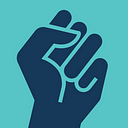Moving From Oppression to Abundance, Within Us and Between Us
This essay captures Solana Rice’s reflections from a LeaderSpring conversation that she led in February 2022. Solana is the co-founder and co-executive director of Liberation in a Generation.
I’ve been thinking about the importance of finding my people. The people that embrace all of me for me. Those who want to dig in to loving debate. Those who validate my feelings and push me to think and feel further. The people who make me feel seen and that I belong. Life generally, but especially in the work of making justice, is best when we find our people.
Speaking with the participants of a recent LeaderSpring event certainly left me feeling like I’ve expanded my circle of people. We covered many topics in two short hours, and here are highlights that I left with and hold dear:
Advancing Liberation Happens on Many Levels at Once:
In Emergent Strategy, Adrienne Marie Brown offers that how we are at a small scale is how we are at a large scale, much like the structure of a fern that repeats its structural fractal pattern. What was clear from this virtual conversation earlier in the year was that the practice of unseating racist ideas and rejecting the harmful beliefs that shape our economy must happen within us, between us, and across our communities all at once.
As a Black woman in America, it’s easy to feel and act as if I am not worthy or valuable or deserving, but interrupting this urge can challenge internalized white supremacy. Changing small practices in our interactions with others, such as blaming others for their own poverty, can help us design better collective responses. Changing the professional practices that are within our control and, on closer examination, are truly unnecessary — and even harmful — can change power dynamics. I think of a push in philanthropy to simplify and even eliminate grant reports as an example. These seemingly small practices add up, dismantling the dominating forces that overpower the broader movement and our collective mission.
These practices are also supported by a set of values. Values and beliefs make their way into policies that govern how we interact with each other within the systems that shape our lives. Cementing anti-racist policies where people of color are beneficiaries of the wealth of this nation that they help create can be a catalyst for repair and healing. At Liberation in a Generation, our values undergird our worldview and the economic transformations we seek for ending the Oppression Economy and building a Liberation Economy.
Leaders of color, in particular, are balancing these practices of interpersonal, intrapersonal, cross community, and societal transformations at once. And as so many practitioners recognize and offer, this work also transcends the here and now. We sit between our ancestors and our descendents all of whom can offer us wisdom and guidance to set these practices into motion.
Using Power and Privilege to Disperse Risk and Change Systems
We all have power. Too many of us, however, do not have the privilege (of time, money, or connections, for example) of exercising that power for change. Through LibGen, Jeremie Greer and I had the privilege of starting a new organization. We were fortunate enough to have the power and privilege to take that professional and financial risk. And all that we do is in service of amplifying the collective power of those fighting for change. Our work is to uncover and shine light on the many decisions, rules, and policies that perpetuate oppression in our economy.
A core question we ask ourselves is: How do we as a movement continually shift the risk away from people experiencing the sharpest edges of our broken economy? One thought: build institutions that can help shift and absorb the risk of calling truth to power — the risk of taking physical or financial action. Organizations that are well-resourced, connected, and working in service of a broader ecosystem of change over long periods of time are institutions. They can weather reputational, financial, and legal risks that individuals can not. When we aren’t using our institutional and individual power and privilege to shift the power and privilege of those who cannot take those risks, we are off the path of liberation.
Find Your People
Liberation does not happen alone. I stay looking for others to help me workshop challenges and embark in scenario planning. Find others who inspire you and be sure to inspire others yourself. Find others to build power with — together. We know that the Oppression Economy thrives from racism, but it’s also entrenched by fabricated senses of competition between us and our paths. As you build, tell others what you’re doing, so we can accelerate change — again, together. LeaderSpring provides a wonderful space for those in struggle together to be a well of support, encouragement and imagination. Grateful for the opportunity to walk alongside you all who joined me there and with everyone reading this and working for a liberated future.
